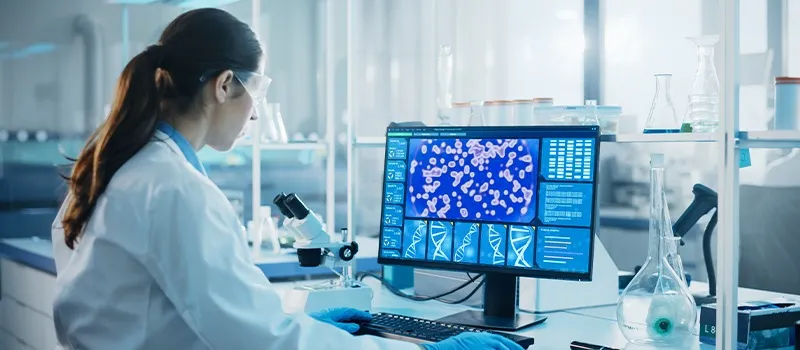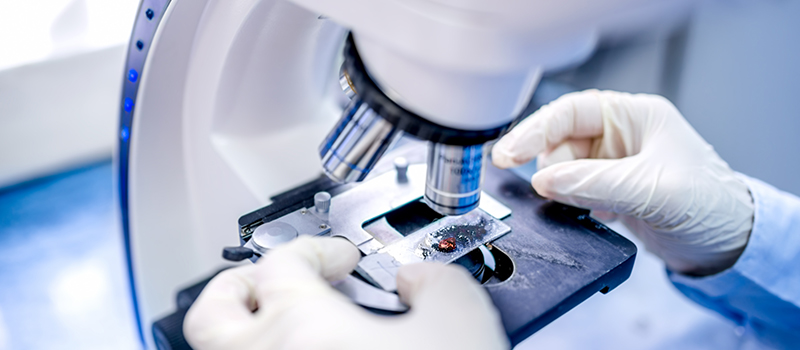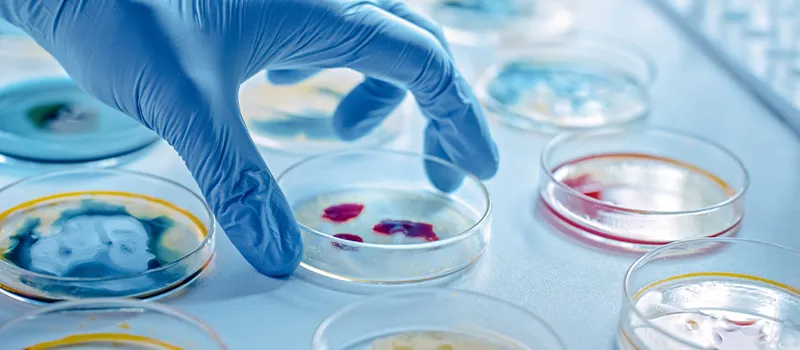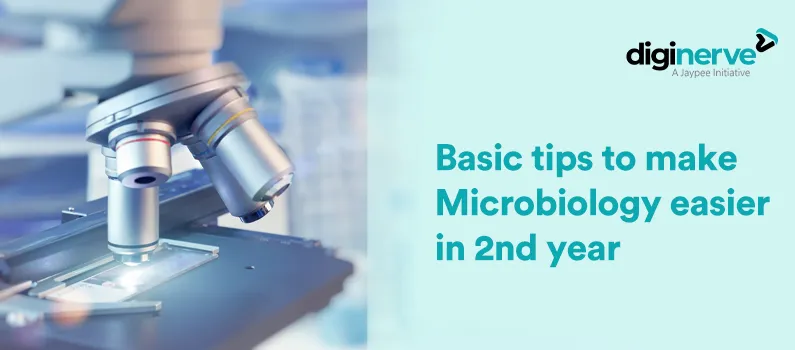
Career as a Microbiologist in India
Microbiologist: A scientist who researches microscopic life processes and life forms is known as a microbiologist. This includes researching the development, relationships, and characteristics of microscopic creatures like bacteria, algae, fungi, several kinds of parasites, and their hosts. Microbiology is used in many aspects of daily life, including food production, biodegradation, the production of commercial goods, and genetic engineering.
In private biotechnology firms and higher education, most microbiologists focus on a particular area of microbiology, such as bacteriology, parasitology, virology, or immunology. Thus, the goal of microbiology is to increase our fundamental understanding of microbes through the investigation of their morphology, metabolism, physiology, reproduction, and genetics. It’s possible that in the next few years, microbiology may be used in a variety of other ways that will be extremely advantageous to humanity in every way. To comprehend these organisms’ traits and identify them, microbiologists concentrate on their identification and growth. This is done with the overarching goal of preventing, identifying, and treating infectious diseases.
Work done by Microbiologists: Microbiologists in India work on a variety of projects that improve our quality of life, including monitoring the impact of microbes on climate change, inventing green technology, guaranteeing the safety of our food, and treating and preventing disease. Microbiologists research microorganisms like viruses, algae, bacteria, fungi, and a few sorts of parasites. They attempt to understand how these creatures live, develop, and interface with their surroundings. Most microbiologists work in research groups with different researchers and experts. By understanding microorganisms, microbiologists hope to provide answers to many significant global questions.
Watch the video to learn Major Healthcare-associated Infection
A wide range of professions in the industry (marketing, technical support, and regulatory affairs), education (teaching, museums, and scientific institutions), business (patent attorney or accountant), and communications (public relations, journalism, and publishing) are also open to microbiologists. The National Health Service organizations, the pharmaceutical and water sectors, as well as forensic science laboratories, employ the majority of those who work in hospitals, laboratories, and offices. The field of microbiology is wide and has connections to biochemistry and immunology, among other biological sciences.
• Healthcare microbiologists
Microbes can be helpful in both health and sickness since they are employed to create novel treatments that aid in the treatment of illnesses and diseases. Microbiologists must first understand how microbes function to tackle microbe-related issues and take advantage of their talents. They can then apply this knowledge to create new technologies, treat or prevent disease, and generally enhance our quality of life. To treat diseases, microbiologists are crucial. Many doctors and scientists work in medical facilities and labs, examining body fluids, blood, and human tissue to diagnose infections, track the efficiency of therapies, or detect disease outbreaks. In hospitals, universities, and medical school labs, some microbiologists hold clinical scientist positions where they conduct research and offer medical staff scientific guidance. To produce vaccines and enhance existing therapies, other microbiologists focus on bacteria that cause diseases like the flu or tuberculosis.
• Climate change and the environment
The carbon and nitrogen cycle are both critical to the functioning of the planet’s nutrition cycles and depend on bacteria. Some microbiologists’ research shows how microorganisms coexist with other animals in a variety of environments, including the ocean, salt lakes, and polar regions. Additionally, engineers and technologists collaborate with microbiologists to create cleaner energy sources derived from municipal and industrial waste.
• Food Availability and Agriculture
Millions of bacteria help us absorb nutrients from food and fight off harmful germs in our stomachs to keep us healthy. Microbiologists study how important soil bacteria are. Some focus on controlling plant diseases and pests, while others use microorganisms to manage weeds and insect pests. Others conduct studies on the microorganisms that afflict farm animals. Microbiologists are employed by numerous bioscience and food industries where they conduct research and create new goods.
Education:
The key steps to becoming a microbiologist after passing class 12th board exams are mentioned below:
• UG Preparation: Candidates can complete MBBS with Microbiology for UnderGrads including biochemistry or cell biology. The candidate should complete foundational courses in computer science, arithmetic, statistics, physics, microbial genetics, environmental microbiology, virology, and biochemistry. Candidates can also pursue B.Sc. with Microbiology. The candidates should be knowledgeable in lab sessions to pursue a career in microbiology in India. By enrolling in preparation classes, applicants should also start their PG admission preparation.
• PG Preparation: After finishing the UG course, the candidate can select to concentrate on PG courses that would work on the possibility of their vocation. M.Sc. in Microbiology can be sought after by the up-and-comers after the culmination of a B.Sc.
After getting your degree you also need to:
• Get some work experience: You might need to concentrate on acquiring work experience concurrently with or after your study. The study of microbiology offers opportunities for both intellectual involvement and practical application. You can apply for internships early on to acquire a good sense of the field and the career positions associated with it, depending on where your interest lies.
• Obtain a doctorate – You must earn a Ph.D. in your branch of microbiology if you intend to conduct independent research, work for a university or government research organization, or both. This covers academic practice, fieldwork, and education for conducting research. A post-graduate degree in a relevant topic with at least a 55% overall average is required for doctoral applications, which may additionally contain a minimum amount of relevant work experience.
Watch this to learn the right way to approach Microbiology
Few Career Opportunities for Microbiology Majors
Opportunities for employment in the government sector, hospitals, public health laboratories, research labs, and industrial laboratories are available to graduates with a Bachelor of Science (B.Sc) degree in microbiology (food, dairy, chemical, pharmaceutical, and genetic engineering companies). Students who pursue degrees beyond the B.Sc have job options in these fields, along with teaching positions in colleges and universities, which come with greater responsibility and commensurately better pay.
* Some of the possible positions are:
-Technician for research laboratories
-Food or dairy microbiologist
-Microbial environmentalist
-Clinical microbiologist or immunologist
-Quality control analyst
-DNA technologists
-Veterinary microbiologists
-Microbial public health specialist
-Biomedical scientists
-Research assistants
-Food technologists
-Environmental microbiologists
-Clinical microbiologists
-Industrial microbiologists
Microbiological graduates are in high demand for their strong scientific, analytical, and problem-solving abilities. It is open to both the public and private sectors. Qualified microbiologists are employed by companies working in agriculture, food, and beverages, chemicals, environmental agencies, private hospitals, research institutes, universities, pharmaceutical companies, and laboratories. Numerous respected companies in India hire skilled microbiologists, including Pfizer, the Indian Hotel Company, Mascot International, the Piramal Group, Sun Pharma, Fortis Hospitals, Apollo Hospitals, Lakshmi Life Sciences, and others. Microbiologists are in high demand worldwide. Opportunities in fields such as healthcare companies, forensic science labs, environmental groups, higher education institutions, food, and beverage, publicly supported research groups, pharmaceuticals, and many more businesses are available to those who hold a degree in microbiology.
Benefits of a Career in Microbiology:
The significant advantages of choosing a career in microbiology are:
• Microbiologists are interested in the study of microorganisms and their various properties, which has a positive impact on their careers. The individual’s career skill set can be improved by using cutting-edge technology to examine the test and culture medium. Additionally, the possibility of participating in the development of a novel vaccine or viral solution can benefit the microbiologist’s career.
• The development of new vaccinations that can stop the spread of illnesses and save millions of lives become possible because of microbiologists.
• Microbiologists research the traits of the bacteria that aid in the creation of various foods and related goods. As a result of their unique experience, millions of people now have access to food security.
Microbiology Career Salary
With the required qualifications, you can earn an annual salary of around INR 3 lakhs as a microbiologist. Working for the government or a private company will earn you a respectable income as well as perks and other benefits. The annual income depends on the area of microbiology that the candidate has specialized in; for instance, a microbiologist can earn over INR 8 lakhs at the senior level, while an industrial microbiologist can earn over INR 5 lakhs at the senior level. Microbiologists with master’s or doctoral degrees can earn extremely significant salaries in both industries. The salary will also depend on a variety of things, like the company, industry, job description, location, etc. Experience is crucial in this industry as it gives you the chance to discover a specific vocation that suits you.
Microbiologists with experience are paid more in this specialty. Microbiology is not easy. Instead, it requires a lot of hard work, but again it is still considered highly competitive in the industry because of this. Experts in the field of microbiology must be well-educated, and well-trained. The field of microbiology will prove to be the best fit for you if you feel at ease working in laboratories and behind the scenes in academic research. If you enrol in one of the top universities offering microbiology courses in India, the field has a wide range of potential applications and can provide you with several international chances.
Related post







